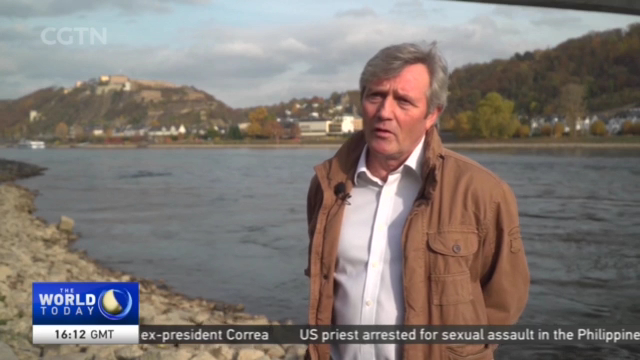
09:07, 07-Dec-2018
Counting the Cost: Extreme summer weather still affecting farmers in Europe
Updated
08:20, 10-Dec-2018
03:31

Much of Europe is counting the cost from this summer's extreme weather which saw long, dry spells and higher-than-normal temperatures. Water levels in some of the continent's most important rivers have dropped to record lows, and this is having a major economic impact in many areas. CGTN's Stefan de Vries has more on this.
In normal times, these are the most fertile fields of Western Europe. After a long, hot and dry summer, they're now colored brown and yellow. Farmers and ranchers have seen their crops vanish their pastures wither.
STEFAN DE VRIES ZEELAND, NETHERLANDS "We are in the South-West of the Netherlands, where the drought this year has been extreme. We are visiting the family de Feijter. They have been farmers since 1811."
They grow onions, sugar beets and wheat. A prosperous business, until this year.
ELLEN DE FEIJTER FARMER "We have never seen what has happened this year before. Usually between April and September we receive about 275 millimeters of water. And this year that has been six millimeters. This year it was not only dry, but we also had two heatwaves in July. The crops cannot handle that stress, and they just stop growing."
The economic impact is enormous. Water levels of European rivers are at historic lows, disrupting shipping and squeezing European supplies of important industrial commodities. This shipper travels three times a week from the port of Rotterdam to the South of Germany. But now he cannot go further than Dusseldorf.
TWAN BRUMMELKAMP CAPTAIN, 'PROGRES' BARGE "Normally we take 250 containers with one load to Germany. It's a traffic jam of 250 trucks."
Now his barge is almost empty, because the ship needs to stay light.
TWAN BRUMMELKAMP CAPTAIN, 'PROGRES' BARGE "It's the first time that we are actually having this long a period and this low. It never happened before."
South of Dusseldorf, the dwindling Rhine paralyzes shipping transport. Near Koblenz, the Rhine is so low, you can almost walk to the other side.
JG BELZ, GEOGRAPHER GERMAN FEDERAL INSTITUTE OF HYDROLOGY "At the lower Rhine we have very poor levels, which we have never recorded before. We have been recording for 150 years, but never had these values."
Because of the low water levels, Twan Brummelkamp has to make more trips to move the same quantity of cargo. And that brings some benefit.
TWAN BRUMMELKAMP CAPTAIN, 'PROGRES' BARGE "For us it is positive now, we're making more money than we used to. But if it goes on for a long time it damages the image of inward shipping."
The De Feiters are less fortunate. After cultivating this land for generations, Ellen says the family is ready to give up. They will sell the farm when Ellen retires.
ELLEN DE FEIJTER FARMER "The groundwater here is salt water. so we cannot use that. When there's no rain, we have no water at all. This is because of too little water."
"So after two centuries, your business will now disappear?"
"Yes, yes."
STEFAN DE VRIES ZEELAND, NETHERLANDS "Farmers all over Europe have seen their crops diminished or destroyed, because of the warm and extreme summer. In face of climate change, they know they have only one option: to adapt. This is Stefan de Vries for CGTN in Zeeland, The Netherlands."

SITEMAP
Copyright © 2018 CGTN. Beijing ICP prepared NO.16065310-3
Copyright © 2018 CGTN. Beijing ICP prepared NO.16065310-3